
“Get out of bed / The day has been / Asking about you.”
This is the opening line to the opening poem, “Good Morning,” from “Helium” by Rudy Francisco. The slim volume will be released Nov. 28.
This is the debut collection from Francisco, who has previously found fame as a spoken-word poet and has performed alongside artists Jordin Sparks and Gladys Knight, among others. Francisco’s piece “Scars/To the New Boyfriend” has amassed almost 1.7 million views on YouTube.
The collection alternates between inspiring and damning — but despite their simplicity, all of the poems in “Helium” pack a punch. The work is easy to read, but meaning is not as easily accessible as the words themselves. Francisco wants the reader to sit with his work, to remember the lines and to chew on them over and over until they are soft enough to swallow.
Francisco wastes no space on his pages, incorporating the titles of the pieces into many of his works, like “Why did you leave?” The lines answer the question posed in the title.
“Because / you wouldn’t let me / love both of us / at the same time,” he writes.
That’s the entirety of the poem. Technically and semantically, the question is answered, but the reader needs to discover its meaning on their own.
In another piece, “Mercy, after Nikki Giovanni,” Francisco engages with the threat of violence against African Americans through his rescuing of a spider. A woman he is with asks him to kill the spider, but he brings it outside with a cup and a napkin instead.
“If I am ever caught in the wrong place / at the wrong time, just being alive / and not bothering anyone,” he writes. “I hope I am greeted / with the same kind / of mercy.”
Francisco has collected awards, both on U.S. stages and international ones, including the 2009 National Underground Poetry Slam Championship and the 2010 Individual World Poetry Slam Championship. His Facebook page, on which he publishes snippets of and complete original poems, has over 123,000 likes.
Though he is a spoken word poet, Francisco’s poems translate just as successfully to the page, with broken rhythms that lead the reader as though Francisco is dancing with you. In the collection as a whole, the placement of the individual pieces is intentional and carefully planned to provide its own meaning.
The poems “Brother” and “Sister,” for example, are situated on two opposite pages, and these works describe the way Francisco protects those he considers to be brothers and sisters, respectively.
In the first poem, Francisco writes, “When I call / you brother, it means you have / at least 4 fists / during any fight / you can’t talk / yourself out of.” And in the second, he writes, “When I call you sister. It means I broke the boy’s arm / when he touched you without / your permission. I’m sorry you had / to see me like that.”
The poems in “Helium” are mostly a single page, rarely more than two, but despite their brevity, the impact of Francisco’s words cuts deep.


